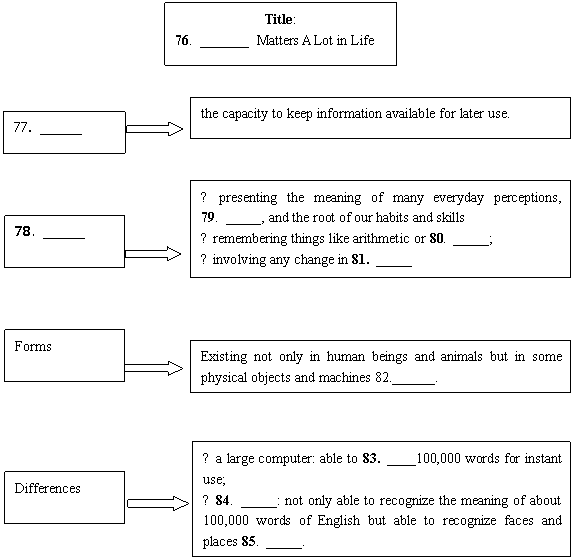题目内容
When a rather dirty, poorly dressed person kneels at your feet and puts out his hands to beg _36____a few coins, do you hurry on, not ___37___ what to do, or do you feel sad and hurriedly ___38___ some money? What should our attitude__39__ beggars be? There can be no question that the world is full of terribly sad stories. It ___40___ be terrible to have no idea where our next meal is going to come from. It seems ___41___ not to give some money to beggars.
__42____, most of the world’s great religions order us to be open-hearted and ___43__what we have with those less lucky than ourselves. But has the world changed? Maybe what was morally right in the old days, ___44___ one knew exactly who in the village had suffered misfortune and needed help, is no longer the best idea. Quite a few people will not give to beggars. Let us look at their ___45__.
First, some believe that many city beggars dress up ___46___ to look pitiable and actually make a good ___47___ from begging. Giving to beggars only encourages this sort of evil(恶行). __48___, there is the worry that the money you give will be spent on beer, wine or drugs. Thirdly, there is the opinion__49____there is no real excuse for begging. One might be poor, but that is no reason for losing one’s sense of ___50___ and self-dependence.
Related to this is the opinion that the problem should be handled by the government __51____ordinary people. Some people think beggars should go to the local government department and __52____ help.
It is hard to come to any final conclusion: there are various __53___and we must __54___ them differently. A few coins can save a life in some situations, and even if the money is wasted, that does not take away the moral goodness of the__55____.
1. A.to B.with C.at D.for
2. A.knowing B.expecting C.demanding D.settling
3. A.put away B.hand over C.take in D.get out
4. A.at B.in C.over D.towards
5. A.must B.can C.need D.might
6. A.warm-hearted B.generous C.cruel D.considerate
7. A.Strangely B.Honestly C.Certainly D.Surprisingly
8. A.give B.donate C.share D.contribute
9. A.why B.when C.what D.how
10. A.arguments B.quarrels C.sayings D.talks
11. A.on show B.on purpose C.for fun D.by accident
12. A.money B.comfort C.living D.decision
13. A.Secondly B.Surely C.Possibly D.Then
14. A.what B.whether C.that D.which
15. A.goodness B.pride C.security D.responsibility
16. A.rather than B.or rather C.other than D.but also
17. A.produce B.receive C.earn D.offer
18. A.cases B.events C.conditions D.states
19. A.go with B.communicate with C.deal with D.meet with
20. A.giver B.receiver C.villager D.government
1.D
2.A
3.B
4.D
5.A
6.C
7.C
8.C
9.B
10.A
11.B
12.C
13.A
14.C
15.B
16.A
17.B
18.A
19.C
20.A
【解析】
试题分析:本文介绍在街上遇到行乞的人,要不要给他们钱,不同的人有不同的观点。
1.考查介词: beg for sth. 是一个固定的词组,意思是乞讨东西。选D。
2.考查动词:A.knowing知道B.expecting期望C.demanding要求D.settling解决,根据句意,这里的意思是:你是否匆匆走过,不知道怎么办。选A。
3.考查词组: put away 的意思是放好;hand over 的意思是递过去;take in 的意思是吸收或者欺骗;get out 的意思是滚出去。根据文章的意思,意思是你感觉很难过并急忙递过去一些钱。选B。
4.考查介词: attitude 和 towards 是固定搭配。选D。
5.这里考查的是情态动词表猜测的用法。本句是肯定句,所以can 不合适。而根据句意,当你不知道你的下顿饭在何方的时候,那生活肯定是非常悲惨的,所以要选择确定的 must,而不是might,因为might 一般都不是很确定。选A。
6.考查形容词:A.warm-hearted热心肠的,B.generous大方的,C.crue残忍的,D.considerate考虑周到的,根据上下文句意。不给乞丐钱似乎是残忍的,选C。
7.考查副词:A.Strangely奇怪地B.Honestly诚实地C.Certainly当然D.Surprisingly令人惊讶地,这里是表示肯定的意思,因为世界上伟大的宗教肯定是要信徒向善的,多做好事。选C。
8.考查词组: share...with...是固定搭配。选C。
9.这里考查的是定语从句中关系副词的用法。先行词是old days,定语从句缺少地点状语,用when引导定语从句。选B。
10.考查名词: arguments 的意思是论点;quarrels 的意思是争吵,吵架;sayings 的意思是名言; talks 的意思是闲谈。根据句子意思,A 选项是正确答案。
11.考查词组的意思。但on show 的意思是在展出中;on purpose 的意思是故意; for fun 是娱乐; by accident 碰巧。选B。
12.考查固定词组: make a living 是固定搭配,意思是谋生,养活自己,符合句意。选C。
13.考查副词:A.Secondly第二B.Surely 当然C.Possibly可能地D.Then然后,根据上文的first。可知选A。
14.考查同位语从句。同位词是opinion,后面是opinion的内容,选C。
15.考查名词:A.goodness好意B.pride骄傲C.security安全D.responsibility责任根据句意。一个人可以贫困,但是不能失去自尊和自立。选B。
16.考查词组意思。rather than 的意思是“而不是”;or rather 的意思是确指,表示进一步明确;other than 的意思是除…以外;but also 一般和not only 连用,意思是不但…而且…。这里需要的是rather than,表示问题应该有政府解决而不是个人。选A。
17.考查动词:A.produce生产B.receive收到C.earn挣钱D.offer提供,句子的意思是乞丐应该找政府部门寻求帮助,指客观上得到帮助。选B。
18.考查名词:case 在这里表示的意思是情况,而condition 表示情况是不可数名词,可数情况下condition 的意思是条件。选A。
19.考查词组: go with 意思是与…相配;而communicate with 意思是与某人交流;deal with 的意思是处理,符合句子意思。meet with 的意思是偶尔碰到。选C。
20.考查名词:A.giver给与者B.receiver接受者C.villager村民D.government政府根据句意,即使钱浪费了,可是给予者的善良是不会被带走的。选A。
考点:考查社会现象类短文
点评:本文是议论文,作者分析透彻,反映的道理深刻,从选项中可以看出,本大题主要还是考查了词汇的辨析与运用,但更加注重综合语言能力的运用,需要根据上下文,了解词汇用法的同时,结合语境,做出准确的判断。

| |||||||||||||||||||||||||||||||||||||||||||||||||||||||||||
